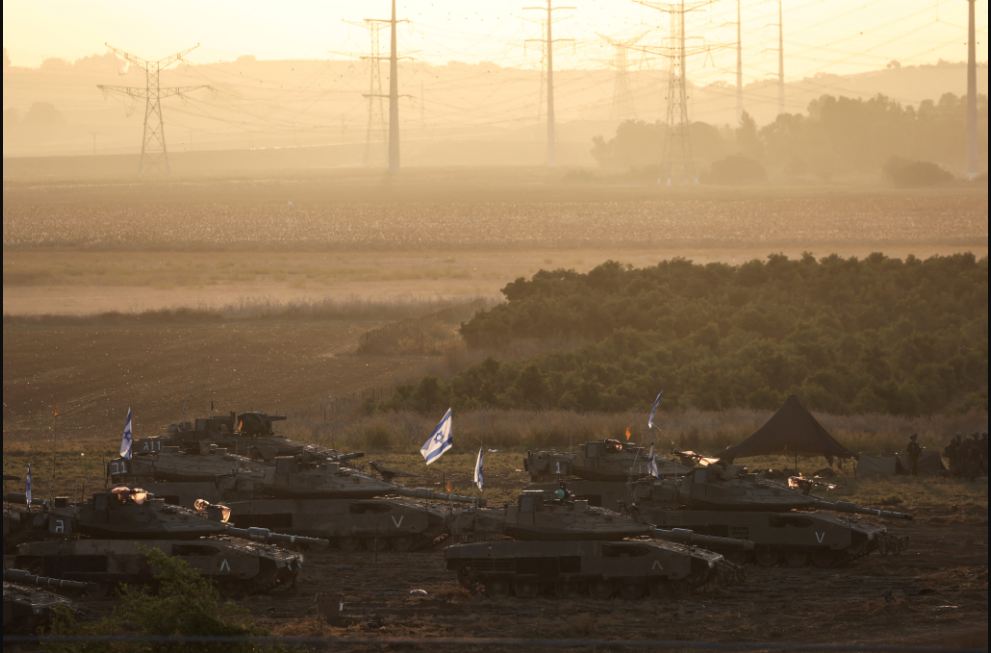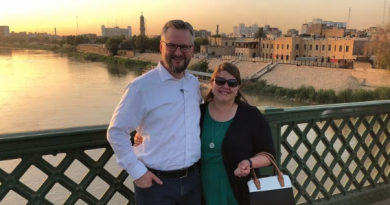Aid to move over Egyptian border unlikely to raise spirits in struggling Gaza
Gaza (Reuters) – Twenty truckloads of aid due to be transported over the Egyptian border are unlikely to raise spirits in the beleaguered Gaza Strip, where Palestinians are squarely focused on surviving Israeli air strikes and acute food and medicine shortages.
After intensive diplomacy, Egypt agreed to reopen its border crossing with Gaza to allow aid to reach Palestinians, the U.S. said, as the humanitarian crisis worsened for the 2.3 million people trapped there and anti-Israel protests flared across the Middle East.
“About the aid, this is something frivolous, we want nothing from Arab and foreign countries except to stop the violent bombardment on our houses,” said El-Awad El-Dali, 65, speaking near the rubble of ruined homes.
Like many Palestinians in Gaza and elsewhere he feels Arab states have not done enough to support the Palestinian cause, especially those who have normalised ties with Israel.
“We want them to stop the bombardment on people who are getting killed inside their houses,” he said.
The United States and Egypt have been pushing for a deal with Israel to get aid delivered to Gaza, and the White House said on Wednesday it had been agreed for up to 20 trucks to pass through the Rafah crossing from Egypt in the coming days, with hopes for more trucks later.
Israel reiterated it would not allow aid through its crossing with Gaza until Hamas released about 200 hostages seized during its cross-border attack on Israel on Oct. 7. Hamas militants killed about 1,400 people in the assault.
Most of Gaza’s residents depended on aid even before the current conflict started, about 100 trucks daily were providing humanitarian relief to the enclave, according to the United Nations.
The Gaza health ministry said 3,478 Palestinians have been killed and 12,065 wounded in Israeli air strikes on the besieged enclave since Oct. 7.
Hospital Blast
The region remained volatile in the aftermath of an explosion at Gaza’s Al-Ahli al-Arabi hospital late on Tuesday, which Palestinian officials said killed 471 people. They blamed the blast on what they said was an Israeli air strike, while Israel says it was caused by a failed rocket launch by Palestinian fighters.
Gaza residents are isolated from the outside world and have little knowledge of the international diplomacy aimed at easing a conflict that erupted when Hamas, which runs Gaza, penetrated Israel and went on a deadly rampage.
Israel and Egypt have upheld a blockade of Gaza since Hamas took control of the territory in 2007, tightly controlling the movement goods and people.
Gazans have grown resilient over the years, surviving wars between Hamas and Israel, blockades, and unemployment in one of the most densely populated areas in the world.
But the Hamas attack, the biggest against Israel since the 1973 Yom Kippur war, followed by the fiercest ever Israeli strikes on Gaza, has created a monumental crisis.
Extended families gather in one place to feel a sense of safety. But it is hard to come by.
“My home fell over me. My daughter, who was the flower of the house, died. Look at these children, they have been injured like me, they took us out of the rubble. What is our fault?” said Hoda Arafat, who was displaced and now lives in a tent.
“There was a woman screaming from under the rubble: ‘save us, save my daughter-in-law, she is bleeding’.”
There are few places to turn for help.
“We want safety, we are civilians, not soldiers, children are out on the street, this is one, two, three, four young children they all ended up on the street, with no food or water, not even international protection nor human rights,” said Salwa Abu Taya, holding a child in her hands.
“It is a shame for them to be left out on the street, how are we at fault? They targeted and displaced us from one place to another.”
‘A Place Of Sorrow’
The Shuhada Al-Aqsa Hospital in the central Gaza Strip said it has run out of medicine.
The Gaza Health Ministry, the Interior Ministry, and the Hamas media office reported intensive Israeli bombing of houses, and roads overnight across the area.
On Thursday morning, planes bombed and destroyed three high-rise residential towers that housed hundreds of families, forcing them to flee, Hamas media said.
In Jabalia refugee camp, people woke up to the sounds of explosions and the destruction of houses. Rescue workers were trying to recover people from under the rubble, health officials and witnesses said.
In one incident, two children, a boy and a girl, were covered by rubble but still alive. One of the boys looked shocked as some people tried to light the area using phone flashlights and the lights of photographers’ cameras.
Gaza residents say places of joy have been converted into areas filled with misery and anxiety.
“This is a wedding hall, where we used to hold our happy events for our sons and daughters, now we are sleeping in it, we are displaced inside it,” said Amena Al-Kitnani.
“Instead of having happy events in the wedding hall, it has become a place of sorrow.”



